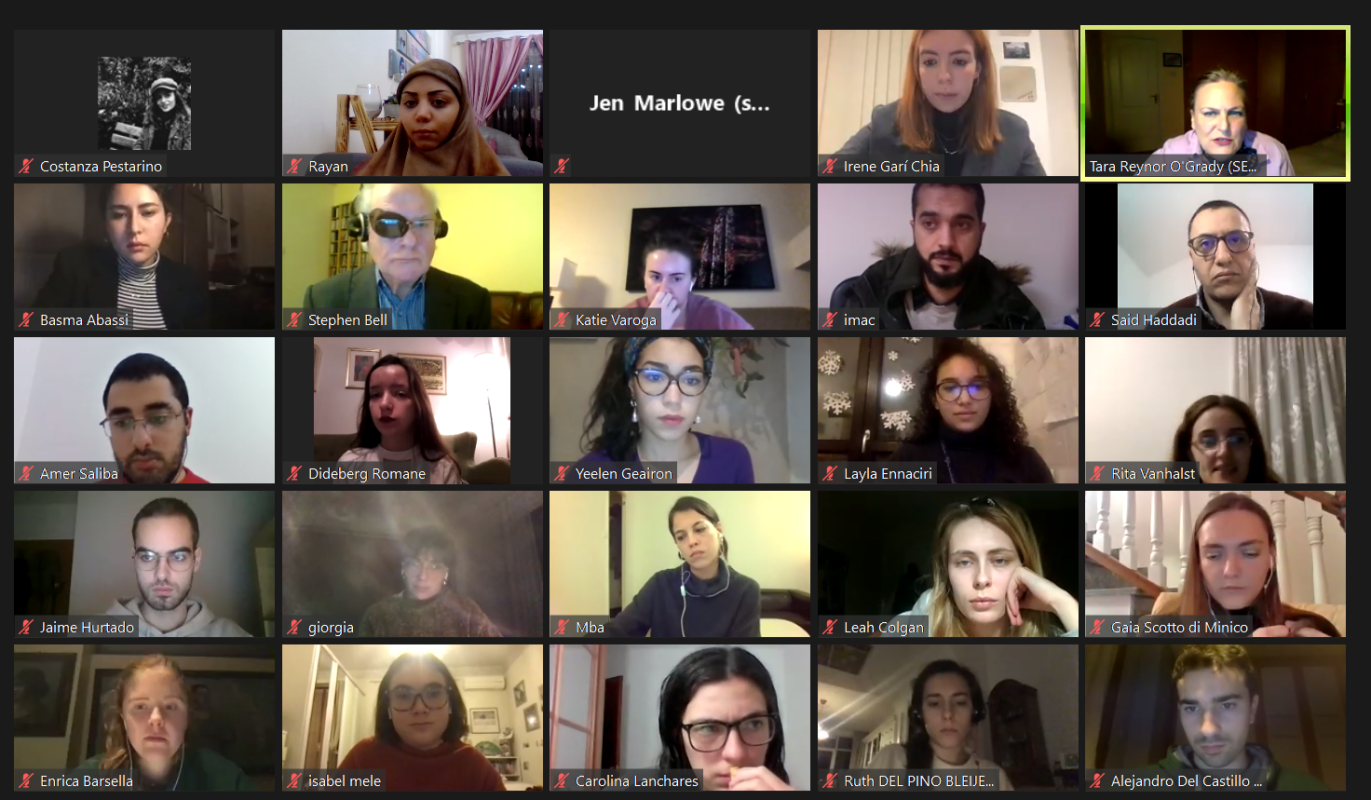Today, 16 December, the European Centre for Democracy and Human Rights (ECDHR) held a webinar in commemoration of Martyr’s Day in Bahrain. The event, entitled ‘Justice for Victims of Extra-Judicial Killings’, focused on commemorating those who have lost their lives at the hand of the Bahraini government and to condemn extrajudicial killings, as well as highlighting the ongoing deplorable human rights situation in Bahrain. The event had four panellists: Jen Marlowe, Tara O’Grady, Said Haddadi, and Stephen Bell; and was moderated by Irene Garí and Basma Abassi, both advocacy assistants at ECDHR.
Jen Marlowe–a Seattle-based award-winning author/documentary filmmaker/playwright and human rights activist–gave a screening of a 4-minute clip from her movie, ‘Witness Bahrain’, about the aftermath of the 2011 pro-democracy protests and the regime’s crackdown. Marlowe’s film looks at the long term consequences on the lives of human beings under this kind of state repression because all too often the individual is forgotten. The clip focused on Ali Jawad Sheikh–who he was, how he was killed, and the impact of his death on his family. Marlowe had the opportunity to meet his family and see how their lives have changed since losing their son. Ali’s mother gave a tearful testimony of how her son was killed on Eid day before they were supposed to visit his grandparents. His own brother witnessed his murder. Afterward, Marlowe emphasized that we should remember the individuals who have been killed or impacted by the Bahraini government’s oppressive policies and tactics.
Tara Reynor O’Grady–a human rights defender and consultant who contributes to developing strategies to encourage positive and productive change and appeals for the judicial accountability of those responsible for human rights aberrations–described the torture and horrible conditions endured by prisoners in Bahrain. She discussed individual cases of prisoners she knows personally in order to expose just how deplorable the conditions are. She condemned the lack of accountability and culpability for the deplorable actions at the hands of the military and police against the protesters, as well as the outright lies told by the Al Khalifa regime. In addition to condemning these actions, she stated that if the situation in Bahrain is not resolved, those responsible can and will be brought before an international court.
Stephen Bell–an anti-imperialist socialist who has campaigned for Labour, Stop the War, Unite Against Fascism, and the Palestine Solidarity Campaign–discussed the complicity of the UK government in the regime’s actions and helping maintain its legitimacy. Bell detailed the UK’s foreign policy regarding the Middle East and how it prioritises ensuring or supporting stability rather than any kind of reform or democracy. He criticized the UK Home Secretary Priti Patel for her visit and statement of support for Bahrain and its supposed progress, despite its clear absence of basic freedom and lack of human rights protection. He discussed the crackdown on civil society by the regime with the closure of independent newspapers such as Al Watan. He went on to condemn the continuing support from the UK and the USA for the Bahraini government. He also accused the US government of being in a Cold War with China, and the UK of supporting them, with Bahrain as one of the proxies for this conflict. He called for an end to British arms sales, a closure of the British naval base in Bahrain, and support for Bahrain’s independence and freedom.
Said Haddadi–Head of Communications at Arab Reform, and previously at Amnesty International and SPAISBristol– gave a summary and assessment of the past 10 years, taking stock of the current democracy and human rights situation in Bahrain. He condemned the failure of the Bahraini Government to implement real and lasting change, despite setting up various new institutions per the multiple international agreements the government has signed. Since June 2016, there have been severe restrictions on civil society. Haddadi described how the authorities continue to shut down and punish free speech and any criticism. He explained how there will be no real reform or solutions to the human rights crisis in Bahrain until the political prisoners and human rights activists are released and the international community is allowed into the country to supervise and apply pressure. He explained that there needs to be a strong, clear message from the international community condemning the ongoing human rights abuses in Bahrain.
After the four panellists were finished, Basma and Irene opened up the discussion to questions from the audience about how best to address the ongoing human rights crisis in Bahrain, as well as how to try and influence any potential change for the better.
Then, following the questions and answers, Helmut Scholz–a German MEP who was in attendance– asked to give a brief statement thanking ECDHR for organizing the event and bringing attention to the voices of those who may otherwise be silenced.





